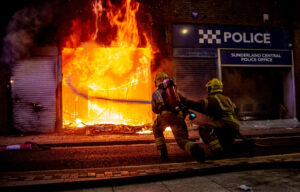As the British justice system continues to lock up overzealous keyboard warriors linked to the riots, and as free speech “warriors” respond with dystopian grumblings about an Orwellian police state, we find ourselves in a strange situation. Put to one side the well-rehearsed posturing concerning double-standards, duplicity and context — and beneath the glare of the black screen lies a point of shared conceptual agreement. Across the political spectrum, under certain circumstances, it is now accepted that speech can indeed be violent.
But should this development be welcomed?
Back in the Sixties, an overly romanticised moment of revolutionary fervour when some intellectuals even garnered rock-star appeal (at least in French cafes), there was an open assault on language and its connection to how we understand the world. Spearheaded by great thinkers such as Michel Foucault and Jacques Derrida, what was seen as the important marker of any shared civilisation — the language which sets us apart from more barbarous animals, as Aristotle mused — was no longer taken as given. The sentences people used were not simply learned, but the outcome of a fractious historical battle that would often normalise systems of oppression, subjugation and hidden forms of violence. In short, what was and was not said could both be boiled down to one single word: power.
As the politicisation of language has continued apace, addressing its inherent power has become a dominant preoccupation for all manner of social commentators. In short, if a claim’s legitimacy is really about the power to impose verifiable truths, everything that passes as truthful is ultimately a matter of perspective. It is no coincidence that the oft-cited phrase “one man’s terrorist is another man’s freedom fighter” has become part of standard political fare
The problem with perspective, however, is that no two people ever experience the same event in an identical way. Moreover, even within “post-modernist” circles, there was some warning against a slide into a purely subjective abyss where the truthfulness of language risked losing all meaning. This was particularly acute when it came to the most emotive of all words: “violence”. Hannah Arendt, for instance, was at pains to argue that words needed to mean very specific things; so when we spoke of violence, we really meant physical violence and the very denial of one’s humanity. Likewise Frantz Fanon held that to speak of violence means speaking of some kind of “intention”.
Intention, however, is no less fraught. As terrorism experts have appreciated for quite some time, motivation is very difficult to prove. Should a person have training manuals for al-Qaeda, enough peroxide to blow up a shopping mall and just so happen to be communicating their hatred for the West, accusations of intention can draw upon laws of probability, as has been the case. But such cases are a rarity. So, as the widening security net during the War on Terror showed, once language becomes securitised and bad deeds linked to claims of extremism marked with intent, the trawler tends to reach wider and pull in those whose words could easily be read as simply ill-considered.
Underwriting the securitisation of language tends to be a neat correlationism, which draws a clear line between what is said and what will be enacted. But for intention to work, should somebody say they want to burn down the house, it has to be assumed that they are indeed intending at some point in their lives to have that house burnt to the ground. Fantasy thus becomes the pre-emptive proof of a reality that should not be left to chance. Regarding the recent case of Julie Sweeney, then, her call to blow up a mosque was no doubt revealing of her rather unsavoury character, which would no doubt warrant a custodial sentence under pre-existing legislation. Yet whether we should call her a would-be mass killer is more open to debate.
It would be foolish to deny that speech can occasionally incite violence and words can undoubtedly be wounding. This needs to be accounted for and persons brought to task for harmful things they have said. But if we are dealing with perception — and recognise that perception matters both in the articulation of truth and whether our words will be believed — we also need to contend with what the comedian Chris Rock brilliantly called “selective outrage”. Whether we agree with what’s said or not, there is a perception in society today that the angry words of some are always presented as threatening and divisive, whereas others would be presented as the most reasoned, just and legitimate of all positions. This was pretty much the argument presented by the radical thinkers of the Sixties, but has mostly now been turned on its head.
Which brings us back to power. It’s worth stressing here that there has never been such a thing as a golden age of free speech. Just as culture has always been a battlefield (sorry to disappoint, but there’s nothing new about the culture wars), so language has always been policed. Our task, then, is to ask who is doing the policing, and in whose name does it serve. Alongside this, we need to be mindful of the climate in which the words are spoken. Or as a comedian might say: timing is everything.
In the post-9/11 environment and the mass acceleration of what Manuel Castells called “the information and communications revolutions”, three developments have made today’s climate notably fraught. Firstly, the fragmentation of societies into multiple identity-based groups enabled by social media has transformed the spoken-word landscape in ways that would have been inconceivable a few decades ago. Partly inspired by the Sixties’ notion that speech and thoughts should be freed from the moral entrapments of the suffocating nation state, many welcomed the internet as a means for democratising language. Yet, as we have found, there is nothing preferable to having everybody say whatever they want, whenever they choose to do so, to whomsoever may be listening. Indeed, if the famous post-colonial scholar Gayatri Chakravotri Spivak could rightly ask “Can the subaltern speak?” just before the dawn of the digital age, it is dubious whether that assertion holds today. Billons now speak of everything, to nobody in particular, all of the time.
Secondly, the culture of the internet has fuelled a marked shift in political contestation, which has notably resulted in a social culture that’s moved from victim-blaming to victim-claiming. The battle lines in politics today are all about who is the greatest victim of history. Trump even played to this when he told Americans for the first time “you are no longer great”, but assured them he could remedy that. Much of this sense of victimisation has absolutely depended upon a broadening of our understanding of violence, which has come to mean so much more than physical force. While this is to be welcomed — ask victims of domestic abuse about the violence of psychological terror — it has raised its problems of its own. After all, if everyone is a victim, who do we prioritise? Do white people, for example, have any right to use the language of victims of history?
And thirdly for Castells, most challenging of all has been the many ways in which most people now simultaneously occupy two worlds and seem utterly incapable of reconciling them both. As we walk down physical streets with devices in our hands that already place them elsewhere, or politely order decaffeinated coffee while verbally assassinating somebody on social media, it seems we are caught in a schizophrenic bind.
The result, as so many of us know well, is the hyper-arousal of the human condition. Here we have a peculiar situation in which people can say whatever comes into their minds without any filter or hesitation, and what is received leads to an equation in which emotion is linked to some unequivocal truth. I am not suggesting emotions are irrelevant. But just because something is said or felt in the heat of a moment, doesn’t necessarily make it a universal truth.
And this has important repercussions for our understanding of violence. For today, just as we’re told that whatever we say can be understood by others as violence, so too are we told that “silence is violence”. You’re damned if you do and damned if you don’t.
Yet while the ability to silence voices remains a hallmark of totalitarian projects, I am suspicious that such a claim holds. Our problem, by contrast, is that we don’t know when to be silent, so that something meaningful may be said amid the digital circus. Even more disturbingly, if everything said or indeed everything unsaid now amounts to a potential act of violence, forming any judgements — political or moral — will surely become impossible. And who could live with such a burden?
Disclaimer
Some of the posts we share are controversial and we do not necessarily agree with them in the whole extend. Sometimes we agree with the content or part of it but we do not agree with the narration or language. Nevertheless we find them somehow interesting, valuable and/or informative or we share them, because we strongly believe in freedom of speech, free press and journalism. We strongly encourage you to have a critical approach to all the content, do your own research and analysis to build your own opinion.
We would be glad to have your feedback.
Source: UnHerd Read the original article here: https://unherd.com/




